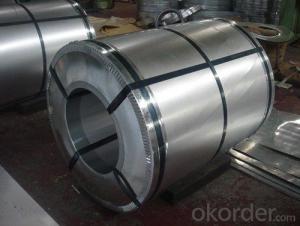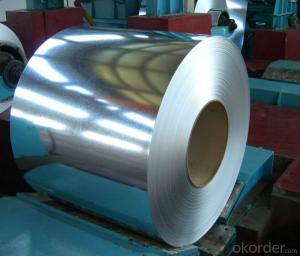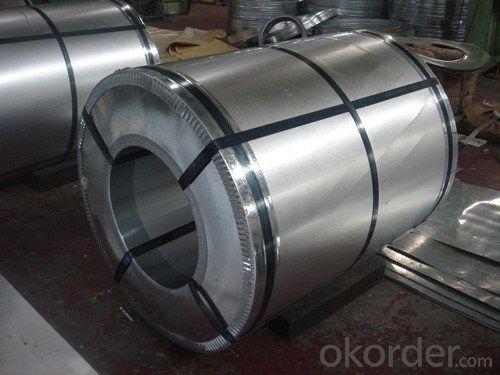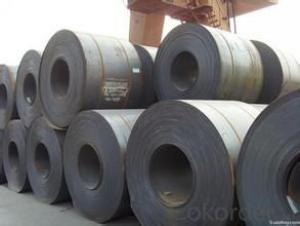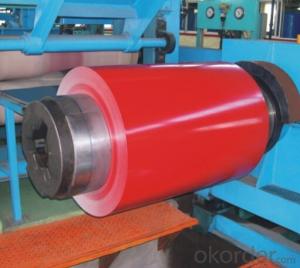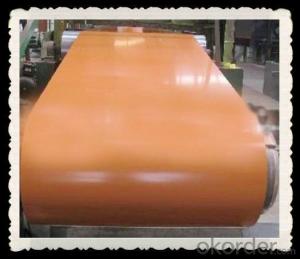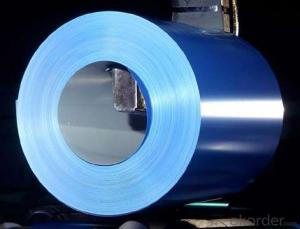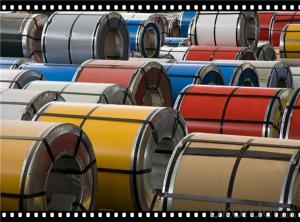Wholesale Galvanized PPGI Zinc Coating30-150GSM PPGI
- Loading Port:
- China main port
- Payment Terms:
- TT OR LC
- Min Order Qty:
- 50 m.t.
- Supply Capability:
- 10000 m.t./month
OKorder Service Pledge
OKorder Financial Service
You Might Also Like
Wholesale Galvanized PPGI Zinc Coating30-150GSM PPGI
Detailed Specifications:
Product | Wholesale Galvanized PPGI Zinc Coating30-150GSM/PPGI |
Base material | Hot dipped galvanized steel sheet |
Top side: | 15-25µm |
Back side | 5-8µm |
Zinc coating : | 30-150g/m2 |
Width | 700-1250mm |
Thickness | 0.3-1.0mm , Thickness tolerance: +/- 0.02mm |
Technique | Cold rolled—>hot dipped galvanized |
Color | All RAL color,or be customized |
Coil ID | 508m&610mm |
Coil weight | ≤5 tons |
Packing | standard seaworhty package |
Special specifications can be negotiated. | |
Application
They are mainly used in construction ,light industry, automobile, agriculture, animal husbandry, fishery and commerce,etc industries.
(1) manufacture anticorrosion, industrial and roof boarding,roof grille.
(2) Make home appliance’s case, civil chimney, kitchen utensils.
(3) Corrosion resistant parts of cars.
(4) Food storage, meat and aquatic products’ freezing and processing equipment.
(5) The equipments to store and transport materials, and packing implements.
Packaging & Delivery
(1)Metal Band Strapping (2) Outside Diameter Ring (3) Label
(4)Protective Steel Sheet (5) Water and Rustproof paper (6)Steel Sheet
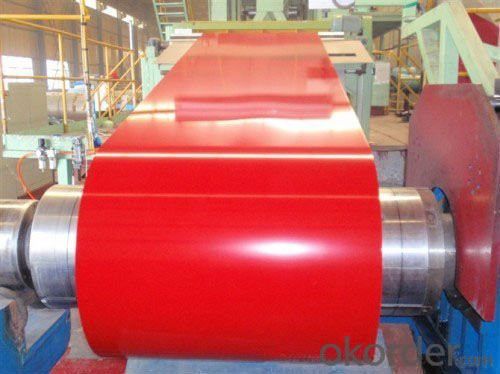
- Q: What is the role of steel coils in the manufacturing of appliances?
- Steel coils are used in the manufacturing of appliances to provide strength, durability, and structural integrity to the appliance components. They serve as the foundation for various parts, such as the body, frame, and internal structures, ensuring stability and support. Steel coils also contribute to the overall performance and lifespan of appliances by withstanding high temperatures, corrosion, and mechanical stress.
- Q: Does anyone know what is 12 gage Cold Rolled Steel meaning? Also, help me to describe it.Thank you so muck ~!Mark Lin
- It's gauge.
- Q: How are steel coils used in the production of metal panels?
- Steel coils are used in the production of metal panels as the primary raw material. These coils are fed into a roll forming machine, where they are uncoiled, flattened, and then shaped into the desired panel profiles. This process allows for efficient and continuous production of metal panels with consistent quality and strength.
- Q: Maybe it is obvious. But i have thought alot about it.I thought steel at a cool temperature was unbreakable. I am not one for science or physics or engineering (i am a political science major). But i don't understand why the planes that struck the world trade center on 9-11 didn't just dent the side and fall,How did the place break the steel? Was it the velocity? Is steel easily broken?I realized that i wasn't taught how the planes broke the steel, and that no one ever asked. I searched the web and i couldn't find the answer or even anyone who had asked the question before.(i don't care about conspiracy theories, i just want scientific facts)
- The buildings only had steel cores within the infrastructure to support the weight and flexibility - quite normal. You would be right if the whole surface of the building was pure reinforced steel with no openings (i.e. a ridiculous giant 100% purely steel tower). Can you imagine the force of a large jet at very high speed hitting a building, along with carrying vast amounts of highly explosive fuel. You don't need to, you've seen it... The bits of steel may well have been undamaged and collectable at ground zero, while the building was destroyed.
- Q: How do steel coils contribute to the energy sector?
- Various contributions are made by steel coils to the energy sector. Firstly, they play a crucial role in the manufacturing of essential equipment and infrastructure for energy production and distribution. Examples include power plants, transmission towers, and pipelines. These structures necessitate robust and durable materials, which are provided by steel coils, ensuring the required strength and reliability. Additionally, steel coils have a significant impact on the renewable energy sector. They are utilized in the production of wind turbines and solar panels. For wind turbines, steel coils are necessary for constructing the towers, while solar panels rely on steel frames for support and durability. With the increasing demand for renewable energy sources, the utilization of steel coils in this sector is expected to rise correspondingly. Moreover, steel coils are integral in the manufacturing of electrical transformers. Transformers are vital components in the energy sector as they facilitate the transmission and distribution of electricity. The core of the transformer, responsible for efficient energy transfer, is created using steel coils. The quality and dependability of the steel coils used in transformers are crucial to ensure the smooth functioning of the electrical grid. In addition to their direct applications, steel coils also indirectly contribute to the energy sector. Steel is a recyclable material, and the recycling process consumes less energy compared to the production of new steel. By employing recycled steel coils, the energy sector can decrease its carbon footprint and contribute to a more sustainable and environmentally friendly energy production process. In summary, steel coils are an indispensable component in the energy sector. They are utilized in manufacturing equipment and infrastructure, including power plants, transmission towers, wind turbines, solar panels, and electrical transformers. Furthermore, the recyclability of steel enhances the sustainability of the energy sector.
- Q: I feel really stupid asking this question but i feel like a put metal/steel strings on my classical guitar how do you tell the difference?
- The g-string will look and feel thicker than usual, and the strings will look almost like copper.
- Q: How do steel coil manufacturers contribute to local economies?
- Steel coil manufacturers contribute to local economies in several ways. Firstly, they create employment opportunities by hiring a significant number of workers, thereby reducing unemployment rates and improving the standard of living in the community. These jobs often include a range of skill levels, from entry-level positions to highly specialized roles, providing a diverse range of employment options for locals. Additionally, steel coil manufacturers contribute to the local economy through their supply chain. They typically rely on local suppliers for raw materials, transportation services, and various support services, fostering business relationships and boosting the local economy. This leads to increased revenue for these suppliers and stimulates economic growth in the region. Moreover, the presence of steel coil manufacturers can attract other businesses to the area, such as logistics companies, distributors, and machine shops, which further enhances the local economy. This expansion of the industrial sector can result in a multiplier effect, generating additional job opportunities and attracting investment from outside the community. Lastly, steel coil manufacturers often engage in corporate social responsibility initiatives, such as supporting local charities, sponsoring community events, or investing in infrastructure development. These contributions not only have a positive social impact but also contribute to the overall economic development and well-being of the local community. In summary, steel coil manufacturers play a crucial role in local economies by creating jobs, stimulating the supply chain, attracting businesses, and investing in community development, all of which contribute to the growth and prosperity of the region.
- Q: I beat fallout 3 and i downloaded broken steel expansion. I have no idea how to get to broken steel in other words i do not know how to start playing it.
- Sorry, all three above are wrong. Once Broken Steel is downloaded via windows live it's supposed to start automatically, but if it's not then one should launch Fallout 3 from the Fallout3Launcher.exe and in the Data Files section checkmark Broken Steel before hitting Play Game. Then, if you've done everything right, no matter if you're first level stuck in Vault 101 or 20th level playing for 69 hours, in about a minute or so a message will appear saying that Broken Steel is installed and that your level cap has been raised from 20 to 30. Even if you don't proceed through the main quest to the new Broken Steel quests, Broken Steel content will still appear in your game, from Supermutant Overlords with Tri-Laser Rifles to Albino Radscorpions, they're all out there in random encounters. Broken Steel is how the game should've been released from the beginning if Bethesda had any conscience, but now that we've got it, enjoy it.
- Q: I need details for steel column splices welded or bolted. References or autocad blocks will be very useful. Thank you very much!
- Boy oh boy, that request would open you up to a bunch of different types of files and drawings. There are so many different ways to make a column splice for structural steels. And they all would depend greatly on the loads that the joint will be subject too. You need to find a copy of the Manual of Steel Construction Ninth edition (or newer if its out, mine is the ninth), from the AISC 'American Institute of Steel Construction. This book will show you quite a few different connection options, welded and bolted. You will need to make drawings from the dimensions and details you see in the book. One other thing, you might try to find a manual for steel detailing, the seventh edition of the above book had a section to show detailing dimensions for different steel elements, dependant on the size and shape of the member itself.
- Q: Are steel coils used in automotive manufacturing?
- Yes, steel coils are commonly used in automotive manufacturing. They are used to make various components of vehicles such as body panels, chassis, and suspension systems. The high strength and durability of steel make it an ideal material for ensuring the safety and performance of automobiles.
Send your message to us
Wholesale Galvanized PPGI Zinc Coating30-150GSM PPGI
- Loading Port:
- China main port
- Payment Terms:
- TT OR LC
- Min Order Qty:
- 50 m.t.
- Supply Capability:
- 10000 m.t./month
OKorder Service Pledge
OKorder Financial Service
Similar products
Hot products
Hot Searches
Related keywords
